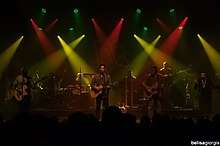Natiruts
Natiruts is a Brazilian reggae band from Brasília. Formed in 1996, Natiruts has released six studio albums and five live albums during a career spanning two decades. The group released its debut album Nativus in 1997 and increased in popularity through its 2009 album Raçaman and the accompanying single "Sorri, Sou Rei". The group's 2012 album Acústico was nominated for Best Brazilian Contemporary Pop Album at the 2013 Latin Grammy Awards.
Natiruts | |
|---|---|
 Natiruts in 2013 | |
| Background information | |
| Origin | Brasília, Brazil |
| Genres | Reggae, reggae fusion, MPB, Samba reggae |
| Years active | 1996-Present |
| Website | Official Website |
| Members | Alexandre Carlo Luís Mauricio |
| Past members | Bruno Dourado Izabella Rocha Kiko Peres Juninho |
History
Natiruts formed in 1996 after a barbecue in lead vocalist Alexandre Carlo proposed the idea of popularizing reggae in Brazil.[1] The band changed its name several times in its early stages, beginning with the name Nativus, which was already taken, then to Os Nativos, then to Natiruts Reggae Power Ao Vivo, which was later shortened to Natiruts.[1] Having formed in Brasília, Natiruts deviated from the local rock scene in the city by singing about spirituality and environmentalism.[2] Despite the band's perception that the city was not the "ideal environment" for tropical music in that it lacked beaches and other aspects associated with the genre, the group demonstrated strong reggae influences since its formation.[2] The band's debut album, Nativus, was released in 1997.[1]
Despite gaining local popularity in its formative years, Natiruts' 2009 album Raçaman, was viewed as the group's breakthrough album.[1] In 2009, the band released the song "Sorri, Sou Rei", which became one of the group's signature songs.[3] The group's 2012 album Acústico was nominated for Best Brazilian Contemporary Pop Album at the 2013 Latin Grammy Awards, but lost to Músicas Para Churrasco Vol. 1 Ao Vivo by Seu Jorge.[4] On October 1, 2016, Natiruts performed at the SOMOS event in Puerto Rico to celebrate the twentieth anniversary of the formation of Puerto Rican reggae band Cultura Profética.[5] The band's 2017 music video for "Sol do Meu Amanhecer" featured Game of Thrones actor Diogo Sales and Miss Brazil 2016 Raissa Santana.[2] Lead vocalist Alexandre Carlo participated in a virtual Mother's Day festival on May 10, 2020 during the COVID 19 pandemic.[6]
Artistry
The band is primarily reggae but has also incorporated elements of rock, funk, and dancehall.[2][3] Lyrically, the band discusses spiritual and ecological concerns.[2] American musician Michael Franti, a fan of the group, claims that Natiruts "are legendary in their native Brazil".[3]
Members
Main line-up
- Alexandre Carlo (vocals and rhythm guitar)
- Luís Mauricio (bass)
Additional line-up
- Kiko Peres (lead guitar)
- João Ferreira (acoustic guitars)
- Bruno Wambier (keyboards)
- Lucas Pimentel (drums
- Denny Conceição (percussion)
Discography
Studio albums
- 1997 - Nativus
- 1999 - Povo Brasileiro
- 2001 - Verbalize
- 2002 - Qu4tro
- 2005 - Nossa Missão
- 2009 - Raçaman
- 2017 - Índigo Cristal
- 2018 - I Love
Live albums
- 2003 - Luau MTV
- 2006 - Natiruts Reggae Power Ao Vivo
- 2012 - Natiruts Acústico no Rio de Janeiro
- 2014 - #NoFilter
- 2015 - Reggae Brasil
DVD
- 2006 - Natiruts Reggae Power Ao Vivo
- 2012 - Acústico no Rio de Janeiro
- 2014 - #NoFilter
- 2015 - Reggae Brasil
References
- "Natiruts vuelve a la Argentina: reggae 'alla' brasileña y algo más". Clarín (in Spanish). September 12, 2019. Retrieved June 23, 2020.
- "Natiruts: el reggae según Brasil". Billboard Argentina (in Spanish). August 10, 2017. Retrieved June 23, 2020.
- "Michael Franti Shares Bathtub Pool Party Playlist". Billboard. April 22, 2020. Retrieved June 23, 2020.
- Khoshaba, Christy (November 21, 2013). "Latin Grammys 2013: The complete list of winners and nominees". Los Angeles Times. Retrieved June 23, 2020.
- "Brasileños Natiruts actuará en XX aniversario banda boricua Cultura Profética". San Diego Union Tribune (in Spanish). September 14, 2016. Retrieved June 23, 2020.
- Burstein, Sergio (May 7, 2020). "Este festival virtual de música latina promete ponerte a bailar durante el Día de la Madre". Los Angeles Times (in Spanish). Retrieved June 23, 2020.